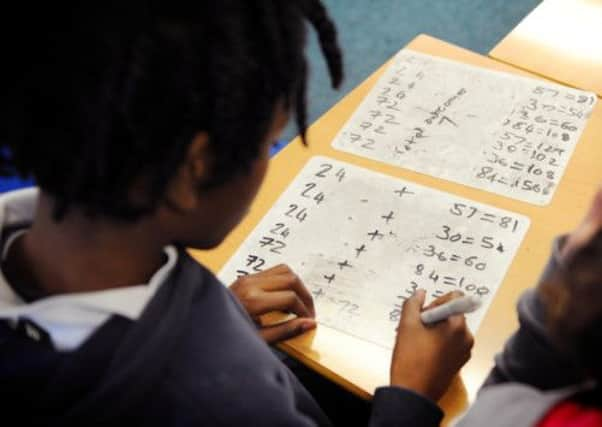Yorkshire pupils struggle most in new reading test


More than a third of pupils in the region failed to reach the expected standard in the reading check which tests how well pupils can use “synthetic phonics”.
The system focuses on the sounds certain letters make rather than recognising whole words. Youngsters are asked to sound out, or decode, 40 words – some of which are made up like “voo”, “spron” and “terg” – to test their reading skills.
Advertisement
Hide AdAdvertisement
Hide AdNationally 69 per cent of pupils achieved the expected standard for the age group, answering at least 32 out of 40 words correctly. In Yorkshire the figure was 67 per cent.
Across the country, the figure for pupils who had English as a first language was the same as those who did not – 69 per cent. But in Yorkshire there was a significant difference – with 68 per cent of pupils with English as a first language making the grade against 64 per cent of those without English as a first language.
Yorkshire has a higher proportion of six-year-olds without English as a first language than most regions in the country, at 15 per cent. This is still below the national average of 18 per cent, however. This figure is skewed by London schools where almost 50 per cent of six-year-olds do not have English as a first language.
Nationally nearly 180,000 youngsters failed to meet the expected standard in the Government’s controversial reading check this year, according to the statistics published by the Department for Education (DfE).
Advertisement
Hide AdAdvertisement
Hide AdThe results also showed a clear gender gap, with girls outperforming boys by eight percentage points.
This is the second year that pupils at the end of year one – the first year of formal schooling – have taken the test.
Ministers have hailed phonics as the best way to boost reading standards, and brought in the check last year amid concerns children with poor reading skills were slipping through the net. Education Minister Elizabeth Truss said: “The phonics check helps teachers identify those pupils who need extra help in learning to read. Many thousands will now receive the extra support they need to catch up with their peers.”
But the test has proved controversial, with some teachers arguing it does not give them information about pupils’ abilities, and risks labelling some youngsters as failures at an early age.
Advertisement
Hide AdAdvertisement
Hide AdChristine Blower, general secretary of the National Union of Teachers, said: “This test really is quite pernicious. To be telling five and six-year-olds that they have failed is quite simply wrong.
“Children develop at different levels, the slow reader at five can easily be the good reader by the age of 11.
“We cannot continue with this obsession of testing and categorising as failures our very young children. In many other countries with successful education systems most children haven’t even started school until seven.”
National Association of Head Teachers general secretary Russell Hobby said: “Despite the Government’s belief, few children are identified as needing extra help as a result of this test, as they have already been identified the year before in reception. The test just takes time out from helping them.
Advertisement
Hide AdAdvertisement
Hide Ad“Given that primary schools have been intensive users of phonics for many years the rise in pass marks this year may well be due to additional training of children to cope with the made-up nonsense syllables used in the test. This just shows that performance in crude tests is not always a reflection of real skills abilities.”